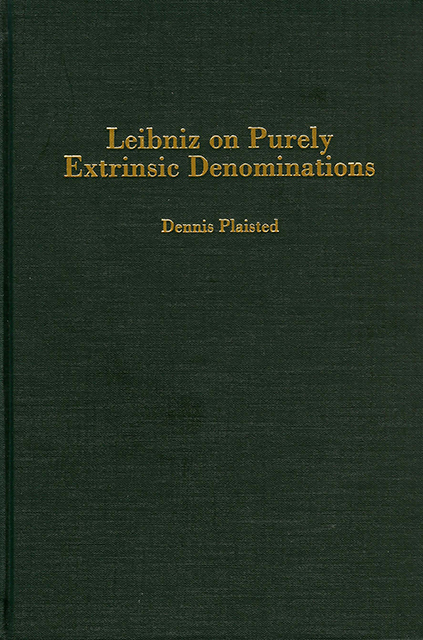Book contents
- Frontmatter
- Dedication
- Contents
- Acknowledgments
- Introduction
- Chapter One Two Views of Purely Extrinsic Denominations
- Chapter Two Truth and Purely Extrinsic Denominations
- Chapter Three Extrinsic Denominations and Where Accidents Are Allowed to Put Their Feet
- Chapter Four Extrinsic Denominations and the Interconnection of All Things
- Chapter Five Extrinsic Denominations and the Foundations of Relations
- Chapter Six Extrinsic Denominations and the Claim that Every Monad Expresses the Universe
- Appendix A Critique of Massimo Mugnai’s Version of NPE
- References
- Abbreviations
- Notes
- Index
Chapter Four - Extrinsic Denominations and the Interconnection of All Things
Published online by Cambridge University Press: 25 March 2023
- Frontmatter
- Dedication
- Contents
- Acknowledgments
- Introduction
- Chapter One Two Views of Purely Extrinsic Denominations
- Chapter Two Truth and Purely Extrinsic Denominations
- Chapter Three Extrinsic Denominations and Where Accidents Are Allowed to Put Their Feet
- Chapter Four Extrinsic Denominations and the Interconnection of All Things
- Chapter Five Extrinsic Denominations and the Foundations of Relations
- Chapter Six Extrinsic Denominations and the Claim that Every Monad Expresses the Universe
- Appendix A Critique of Massimo Mugnai’s Version of NPE
- References
- Abbreviations
- Notes
- Index
Summary
I. Introduction
In this chapter, I examine another argument Leibniz frequently puts forth to establish NPE. In this argument, Leibniz argues that because all things are interconnected (hereafter referred to as IC), there are no purely extrinsic denominations. Perhaps the most well-known passage containing the IC argument occurs in the New Essays:
Philalethes. However, a change of relation can occur without there having been any change in the subject: Titius, ‘whom I consider today as a father, ceases to be so tomorrow, only by the death of his son, without any alteration made in himself.’
Theophilus. That can very well be said if we are guided by the things of which we are aware; but in metaphysical strictness there is no wholly extrinsic denomination, because of the real connections amongst all things.
As was true of the PS argument, the argument here appears rather simple. The only premise Leibniz, through the person of Theophilus, offers for NPE is IC. Yet despite the simplicity of its structure, the argument is not at all easy to reconstruct. First, IC, its premise, must be interpreted, and this task is not as easy as one might hope, for Leibniz never explicitly defines IC. However, Leibniz’s pronouncements on the doctrine do permit the reaching of a relatively high level of certainty as to what he meant by it, and an examination of these pronouncements will be the subject of section II of this chapter. The result of the examination is that when Leibniz asserts IC he is claiming that a change in one thing entails a change in every other. Second, it is not easy to see why Leibniz would even want to infer NPE in the context of the IC argument. As the quote from the New Essays indicates, Leibniz is concerned with the issue of whether a thing changes whenever one of its extrinsic denominations does. The passage also shows that Leibniz believes that things do change whenever their extrinsic denominations do, and this is just what (9) from chapter two maintains. In the PS argument for NPE, Leibniz derives NPE from PS and then obtains (9) from NPE. As I will explain in section III, (9) is virtually an immediate consequence of IC, and so since (9) is the conclusion Leibniz seems to want in the IC argument, the question arises of why Leibniz concludes NPE rather than (9) in the argument.
- Type
- Chapter
- Information
- Leibniz on Purely Extrinsic Denominations , pp. 47 - 68Publisher: Boydell & BrewerPrint publication year: 2002



